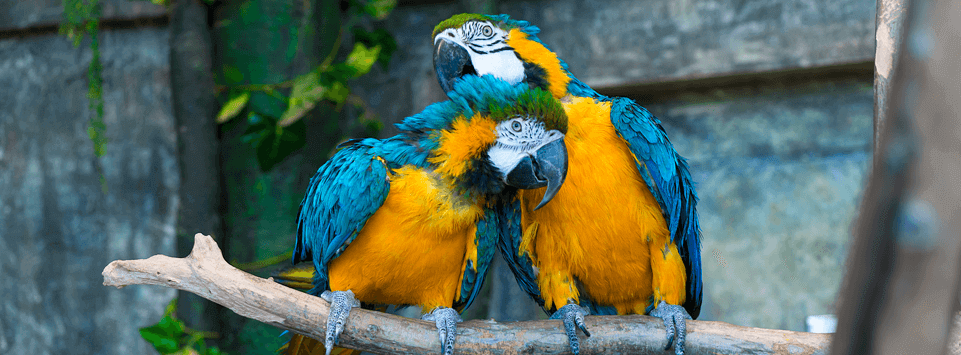Common Bird Illnesses and How to Avoid Them
Birds make wonderful and intelligent pets. Many people consider these feathered friends a little easier to care for than furry creatures, as they don't need walking outside, they eat less than a cat or dog, and they can be popped back in their cage if needed.
However, birds are prone to certain health conditions and it's important not to become complacent with their care and husbandry.
Luckily there are easy ways to avoid these common health conditions and ensure your tweetie stays healthy and happy.
If your bird ever appears unwell, always take them to the vet. It's a good idea to research where is the closest avian vet to you, so you'll know in any future emergencies.
External Parasites

Mites and lice are the two most common external parasites that affect pet birds. Your bird may become infected from the aviary you purchased your bird from, or from wildlife that passes near your house. Both bird mites and lice are not transferrable to or from humans.
Mites are microscopic creatures that cannot be seen with the naked eye. They cause a, itchy scaly, crusty look to the face or feet of pet birds and are particularly common in budgies and cockatiels. There are other less common mites that can affect the air sacs and cause breathing difficulties.
Lice, unlike mites, are often visible to the naked eye. They are more common in chickens but can affect parrot species as well. They tend to cause itchiness and can lead to feather loss and skin conditions.
If you suspect your bird might have mites or lice, always consult with your veterinarian to determine an appropriate and effective treatment.
In terms of prevention, it's important to treat your pet bird for external parasites with a mite and lice spray when you bring them home from the breeder, and quarantine them from your other birds for two days before introduction. If your birds are in contact with wildlife or have access to the outdoors, it is worth spraying them once every 6-8 weeks to keep them bug-free.
Always make sure you check with your vet with regards to dose and frequency, so as not to overdose your bird.
Internal Parasites

There are many internal parasites that can affect birds, including roundworms (nematodes), tapeworms (cestodes), flukes, and protozoa including coccidia, cryptosporidia and giardia. Thankfully these parasites are rare in pet birds who were purchased from a reputable breeder and have been kept mostly indoors.
Signs of worm infestation can include weight loss, lethargy, sitting fluffed up, decreased appetite, and abnormalities with droppings including diarrhoea or blood in the stool.
The best way to check if your bird has worms is to get the faeces checked at the vet, as some parasites require different treatments and some infestations require strict monitoring after treatment.
Pet birds don't generally require regular worming every three months like dogs and cats, as birds don't get outdoors as much as their furry friends. However, you should consider worming your bird if they have access to the outdoors, as well as any newly adopted birds before introducing them to your current aviary. Vetafarm Wormout Gel is a handy in-water treatment that treats for all important species of worms.
For protozoal infections (such as coccidia and giardia), you will need a diagnosis and antibiotic treatments from your vet. To avoid protozoal infections, try to keep your bird away from wild birds, and ensure their cage and water are kept as clean as possible.
Nutritional Deficiencies

Nutritional deficiencies are extremely common in birds, and usually occur from feeding an incorrect or unbalanced diet. Vitamin A deficiency, iodine deficiency, and calcium, phosphorus or Vitamin D imbalances are the most common nutritional diseases in pet birds.
Vitamin A deficiencies can occur in birds on a diet high in seed, as seeds are deficient in Vitamin A. This deficiency can cause lesions on the surface of the mouth, eyes, and nose, leading to nasal discharge, sneezing, conjunctivitis and eye swelling, poor feather quality, and decreased appetite. Vitamin A deficiency also affects the immune system and renders the bird susceptible to infections. To reduce the risk of Vitamin A deficiency, always feed your bird a good quality pelleted diet, and leave seeds as an occasional treat.
Iodine Deficiency, or goiter, can also occur in birds on an all-seed diet. Signs include breathing difficulties or wheezing. As with Vitamin A, this deficiency can be treated with a swap to high quality pellets.
Calcium, phosphorus and Vitamin D imbalances also occur with all-seed diets, particularly if they are high in sunflower seeds. Poor exposure to sunlight, as often occurs in indoor birds, can also lead to imbalances. Calcium, phosphorus, and vitamin D are important for bone and neurological health, so deficiencies can lead to weakness, tremors, seizures, and bone fractures, as well as thin-shelled eggs.
Daily exposure to direct sunlight restores the balance of vitamin D and calcium, as well as swapping to a high quality pellet diet.
When giving your bird access to sunlight, always ensure they have access to shade at the same time so they can moderate their heat, and make sure they are either supervised or protected from outside predators.
Obesity

Obesity is a lot more common in pet birds than you might realise. Because of their feathered coat it is impossible to know whether your bird is overweight just by looking at them. Body condition in birds is assessed by feeling for the keel bone, which is the bony ridge that divides the two breast muscles. The bone should feel present with not too much flesh covering it from either side, but also not too prominent or ridge-like.
Birds fed a high-seed diet are often obese, particularly if there are a lot of sunflower seeds in the diet. Sunflower seeds are often called 'birdie mars bars' as they are so high in fat and calories.
The easiest way to prevent your bird from becoming overweight is by feeding them a base diet of high-quality pellets, and instead leave seeds as an occasional treat only. If your bird is used to a seed-only diet, it's never too late to swap them over to a pellet diet. (Yes, they will sulk and complain, but they will get used to it eventually.)
Beak and feather disease

Psittacine Beak and Feather Disease is caused by a contagious virus. It can affect almost all species of birds, and is seen a lot in wild populations of cockatoos in Australia. The virus is very contagious and spread via contact with shed feathers or dander. The disease presents as abnormal weak feathers and loss of feathers, as well as suppressed immune system and general illness.
Because there is no cure, prevention is key. To prevent your bird from catching beak and feather disease, there are a number of things you can do. In addition to ensuring you only buy birds from a reputable breeder, it's also important to ensure strict hygiene standards at home with good dust control, and always make your bird has little or no contact with wild birds. Of course, ensuring your bird's immune system is in fighting form with top nutrition, welfare and husbandry also helps considerably.
Yeast infections

Yeast, or fungal, diseases are common in birds, and are often secondary to other conditions that decrease the immune system such as nutritional deficiencies (particularly vitamin A deficiency). Species of yeast that affect birds include candida, aspergillus, cryptococcus, and malassezia. Yeast infections usually either affect the respiratory tract or the digestive system and can present as weight loss, lethargy, regurgitation, diarrhoea, sneezing or breathing issues.
Yeast infections require treatment by your vet, but prevention can be done at home. The best way to reduce your bird's risk of a yeast infection is by ensuring their immune system is strong via balanced nutrition and reducing stress as much as possible. Always ensure you give your bird enough attention and time outside the cage, as psychological neglect is a major cause of stress in lonesome birds.
To ensure your pet bird avoids these common avian diseases, good husbandry is key. By providing top quality nutrition, ensuring daily access to sunlight, keeping good hygiene, and reducing stress at home for your bird with lots of love and attention, you can help keep your tweetie happy, healthy, and chirping away.
When Carla isn't talking about petcare at PetCircle, she enjoys playing mum to her fluffy little cross-eyed feline fur baby, Smudge.
Suggested for you
























